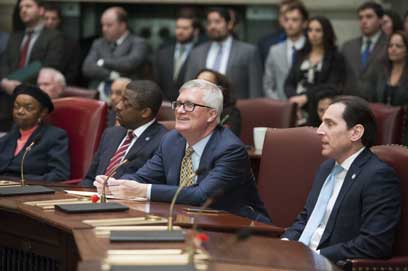An 11-year Albany veteran switched houses this year when he joined the state’s upper chamber to fill the seat of a Brooklyn Heights legislator who stepped down in August. The newly elected Democratic state Sen. Brian Kavanagh now serves constituents in the Heights as well as parts of Greenpoint, Williamsburg, Dumbo, Cobble Hill, and Carroll Gardens in addition to representing Manhattan — the home of his old Assembly district, and where the legislator still lives. Kavanagh, who faced a contentious election heavily influenced by local party bosses, said that process didn’t stop him from hitting the ground running upon taking office. And told us that he is aggressively working on several issues important to those Brooklynites he now represents.
Julianne Cuba: You’re new to the borough. How will you juggle representing parts of both Brooklyn and Manhattan?
Brian Kavanagh: Any state Senate district is substantially larger than any Assembly district, so it will be a step up in terms of having to understand communities I haven’t previously represented. Brooklynites care very deeply about the Brooklyn–Queens Expressway. I worked on the L-train shutdown from the Manhattan side — that’s an issue people care about on both sides of the river. Other topics such as preventing gun violence, reforming election laws, neighborhood affordability — those are things I have experience working on that allow me to serve a lot of people.
JC: What are the odds of the state passing legislation allowing “design-build” to speed up repairs to the Brooklyn–Queens Expressway? What will happen if such a bill doesn’t pass?
BK: I think we have a very good chance of getting this done in the budget. Everyone understands design-build would cut about $100 million and two years off the job. It’s a good example of why we should be allowing design-build on large-scale projects. We’re making the case to the governor, and I think we’re going to succeed. But if we don’t get design-build by this spring, there will be really problematic implications.
JC: Do you support the mayor’s proposed light-rail trolley, the Brooklyn Queens Connector, which would run through parts of your district?
BK: Although the plan has been mentioned for a while, I think it is still in its infancy, and it’s hard to take a stand on a project that doesn’t have a clear proposal. I don’t have a firm position whether it should be built or what the routes should be. But if the project will impact the Brooklyn–Queens Expressway’s repairs, as I read in your paper, we obviously need to make sure that it doesn’t impede the city from rehabbing the BQE.
JC: Do you support expanding Brooklyn Bridge Park to Red Hook, as proposed by engineering firm AECOM?
BK: I’m somebody that’s very interested in expanding parkland to use our waterfront in ways that’s useful to our communities, but as you go south it’s not my district.
JC: What do you think about the towers rising at Brooklyn Bridge Park’s Pier 6 while a judge continues to deliberate their legality, and how do you feel about development inside the park in general?
BK: I’m not in a position to comment on the merits of the lawsuit, those are complicated legal questions. But we should be minimizing development that infringes on parkland. I joined Daniel Squadron’s commitments to make sure there’s a functioning swimming pool there in 2018 — the last summer of the pop-up pool — and I’m pushing to ensure that there continues to be a pool in the park in 2019 and beyond.
JC: The way in which you became the state senator ruffled some feathers. What do you say to those frustrated by the election, and what are you doing to reform election laws?
BK: No one in the legislature has spent more time and effort to make sure election laws are fair and allow voters to have an opportunity to vote. They are outdated and I’ve spent my carer trying to modernize them. I think we can all agree a primary followed by a general election is the gold standard for filling the seat, but both the Manhattan and Brooklyn county committees followed the law and their rules. I understand people’s frustration, and that people had some expectations that it might be done differently, and I’m happy to participate in conversations about how to do it differently.
JC: How does it feel moving from the Democratic-controlled Assembly to the state Senate, which is still controlled by Republicans?
BK: In some ways it’s basically the same, I’m a legislator and my job is working to get laws passed and improve people’s lives. The things I wanted to do in the Assembly always need to go through state Senate, and I’m now in a position to take up the fight for those things in the upper house.
JC: What are your thoughts on the state Senate’s breakaway bloc the Independent Democratic Conference, which sits with the Grand Old Party to give it the majority. Will you ever join it?
BK: I believe really strongly that if you’re elected as a Democrat, you serve as a Democrat. I’m going to do everything I can to make sure Democrats get control.

























